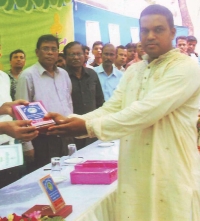BEHIND THE SCENE
Kurigram
Agro Visionary
At a very a young age Saif Uddin is considered a pioneer in agro business of different types. Inspired by Shykh Seraj, he produces different fruits and fish fries. He is an inspiration to all in the village. Many have begun to follow his footsteps and are becoming self-reliant.
.................................................................................................
Iqbal Siddiquee
It is ironic that a freshly hatched fish is called a “fry”. Saif Uddin Al Faruquee has made name for himself in his area for pioneering in farming in a different way at his village. A number of people have started following him recently. He was successful in launching an agro-based-fishery project in his village (Daulatpur of the Dakshin Surma upazila in Sylhet district). The fisheries department gave him an award for being the best fry producer of the district in 2011.
Although Saif started his seed business in the early 90', he was greatly inspired by Shykh Siraj's TV programme-'Mati O manush'.
| |
 |
| |
Saif Uddin receiving award |
He started rearing fry in 1994, and still does. However, he has expanded his business to a nursery, a fruit garden and poultry farm. Apart from that, he has also set up a bio-gas plant near his house for cooking facilities as it helps supplying electricity during load shedding.
Saif established a fruit garden with mango and other fruits (grafting) of high yielding varieties that he collected from the Bangladesh Agricultural University (BAU), Mymensigh in 2008-2009. His garden contains plants like Amropali, Sraboni, Ranguain, Pali and hybrid-10. He also has Guava, Carambola (Kamranga), BAU Kul, Sofeda (local name) and Lichi plantations. All these were collected from BAU and started yielding in 2011. Some of the plants yield fruits twice a year. However, much labour is needed for those.
Saif also has a plot of advanced and high yielding varieties of Tomatoes. The tomato plants are produced through grafting with eggplants and it yields fruits twice a year. He earns more than Tk. 1,00,000 per year just from his tomatoes. Sometimes for a better price, he harvests the fruits ahead of the traditional season, aside from that he also harvests at the end of the winter season.
Expansion of the fruit garden and fishery project is on, and hopefully it will be completed by 2014. Presently, he sells about 50,000 to 60,000 saplings/plants of different types from his nursery each year.
“Now I have 4 ponds close to my house for rearing fries on a commercial scale while 9 others are on lease at nearby villages; Kotalpur and Turukkhola for fish farming,” Saif adds, “on average I have an annual earning of Tk. 10,00,000.
He gained a lot of practical knowledge while working with the special programme called 'Orange & Pineapple Development Project' of the Department of Agriculture Extension (DAE) which was launched in the greater Sylhet region a few years ago.
Saif trained in advanced agriculture and in fish production from the DAE, BARI and The Department of Fisheries.
Born in an educated middle-class family, Saif is against the migration of unskilled youths from Bangladesh. “It is much easier to do really something good in agriculture here than going abroad spending Tk. 5,00,000 to 15,00,000. Anyone can start an agro based business with lesser amounts and on leased or rented lands,” he said adding, “there is no need for huge bhiga (measurement of land) of lands. It is possible to get the maximum yield by adopting modern technics of agriculture from small pieces of land.” Saif believes that none of this is possible without dedication and self determination. Often, interested people from different parts of the country come to visit his orchard and nursery.
Seeing his success over the years, some of his friends and relatives are also getting interest in agriculture, whereas in the beginning most of them discouraged him.
“Already we, the small milk producers are united through setting up a milk haat, an outlet for supplying milk to the wholesale buyers, especially the sweet store owners, who kept the small producers under pressure for long. At times, they were compelled to sell milk to those buyers at throwaway prices,” he concluded.
Copyright
(R) thedailystar.net 2012 |

